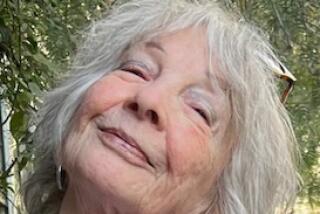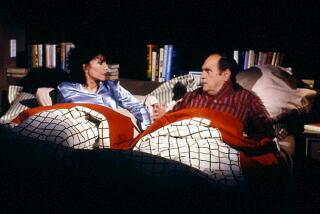Bonita Granville Wrather Dies of Cancer
- Share via
Bonita Granville Wrather, the one-time child star of films whose marriage to Texas entrepreneur Jack Wrather made her head of one of California’s biggest entertainment conglomerates, died Tuesday of cancer.
She died at St. John’s Hospital and Health Center in Santa Monica, where she was admitted on Aug. 22, a spokesman said.
She was 65 and, until January--when Wrather Corp. was sold to Walt Disney Co. for $152 million--had continued to look after the fortune she and her late husband had amassed since their marriage in 1947.
Until her illness curtailed her activities, Mrs. Wrather, who went on stage at age 3 and into films when she was 7, was a working monument to her husband, who died in 1984 after his own battle with cancer.
She had been chairwoman of the board of Wrather Corp., the entertainment concern that ran the Disneyland Hotel, the Queen Mary and the Spruce Goose and that owned television syndications of “Lassie” and “The Lone Ranger.”
The lush board rooms she presided over late in her life were light-years removed from the modest sound stages she had occupied as a girl, when she portrayed a series of vicious children in low-budget pictures that to this day remain popular with film cultists.
She was the daughter of Bernard Granville, a Ziegfeld Follies dancer and granddaughter of Maria Brambilla, a ballerina with the Ballet Russe de Monte Carlo.
The family had her on stage as a baby and, after a move to California, in films as a child. Her first picture was “Westward Passage,” in which she portrayed Laurence Olivier’s daughter. But soon her flair for more serious roles led her to parts as “the wicked kid.”
As early as 1938, when she was only 15, she was regretting roles like the bewitched village girl in “Maid of Salem.”
“They aren’t me,” said the teen-ager whose friends called her “Bunny.” But the lament to an interviewer did not keep her from the darkest of all her parts, the role of Mary Tilford in “These Three,” a version of Lillian Hellman’s “The Children’s Hour” in which a lying schoolgirl accuses her two schoolmistresses of lesbianism. The portrayal earned her an Academy Award nomination for best supporting actress.
Not all her roles were so gloomy, however. She was Nancy Drew, the girl detective in a series of appealing films of the late 1930s, and by the dawn of the 1940s she was being cast as a leading lady.
Her wartime pictures included “Gallant Sons,” “The People vs. Dr. Kildare,” “H. M. Pulham, Esq.,” “Now Voyager,” “Hitler’s Children” and “Song of the Open Road.”
“Hitler’s Children,” a popular film of the day, was the first to mark her emergence from ingenue parts.
In all she had made more than 50 pictures before Jack Wrather, who had financed one of the last of them, wooed, wed and then retired from acting the petite blonde with the pouting smile.
She stopped making films, except for an occasional one for Wrather Corp. because, as she said in a 1985 interview a year after her husband’s death, “I decided that Jack was not the type of person . . . who would have a wife on location. He was a very strong man. And a jealous man. . . . He wanted my time and my attention and I gave it to him willingly. And joyfully.”
She did venture into television in its early years and was seen in such dramatic classics of the medium as “Studio One” and “Playhouse 90.”
She helped Wrather produce the enormously popular and profitable “Lassie” TV series before moving behind the entertainment scene, as husband and wife concentrated on hotel and real estate ventures.
She also developed her own causes and spoke out often on the need to protect the environment and instill familial wholesomeness in children, themes reflected in the weekly series about a boy and his collie.
Wrather had built the Disneyland Hotel adjacent to the Anaheim tourist attraction in 1955 because his close friend, Walt Disney, could not afford to finance both a hotel and an amusement park. Wrather also acquired acreage north and south of the hotel.
Later the Wrathers turned the city of Long Beach’s Queen Mary venture into a commercially viable attraction and then made a success of Howard Hughes’ giant wooden airplane, the “Spruce Goose,”next door.
His wife took work from their offices in Beverly Hills to their Early American-style Bel-Air home. Papers from baskets marked “Personal” or “Do It Today” or “Long Ranger” vied for attention with phone calls from her son, Christopher, who shared corporation responsibilities with her, or her daughters, Linda and Molly. There were also nine grandchildren in her life.
She said questions about her earlier years in show business embarrassed her as her life moved into the more conservative world of acquisitions and leaseholds. Her friends included the Holmes Tuttles, the Justin Darts, the Henry Salvatoris and Ronald and Nancy Reagan. This was the nucleus of what would be the “kitchen cabinet,” that intimate circle that had urged Reagan to run first for governor of California and then President of the United States.
Mrs. Wrather’s civic interests also mounted as the Wrather successes grew. She was on the board and was a former president of the Los Angeles Orphanage Guild; a founder-member of the Los Angeles Music Center and a member of one of its primary support groups, The Amazing Blue Ribbon.
In 1972, President Richard M. Nixon named her to the board of trustees of the John F. Kennedy Center. Reagan appointed her to another term in 1982.
On Tuesday the White House issued the following statement from President and Mrs. Reagan:
“From her earliest days as a child, Bonita Granville Wrather was a figure of beauty and grace in the motion picture business. Many people will remember her for the films she made that endeared her to her audiences and earned her a very special place in our hearts.
“But more than that, she was a warm and caring friend. For so many years she enriched our lives with her sparkling personality, her wonderful sense of humor, her loyalty and her love. Bunny had a smile that lit up a room and a love of life that made everyone who knew her feel special.
“We have so many warm and special memories of Bunny and Jack, and they live on in our hearts forever.”
At her death, Mrs. Wrather was chairman of the board of the American Film Institute, having earlier served as vice chairman and member of the executive committee.
The child star had become the entrepreneurial equal of her husband, although that seemed small solace to her after his death.
“I always felt that Jack and I would end up together going to the moon,” she said in 1985. “Or doing something very adventurous. Because we loved to do interesting and different things. . . . We were the first people to fly jets from Brussels to New York. We were one of the first people to fly the Concorde. . . .”
And then her voice trailed off.
Funeral services are pending.
More to Read
The biggest entertainment stories
Get our big stories about Hollywood, film, television, music, arts, culture and more right in your inbox as soon as they publish.
You may occasionally receive promotional content from the Los Angeles Times.










